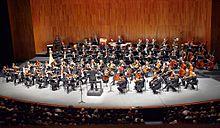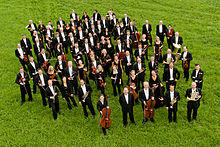
The Mozarteum Orchestra Salzburg is an Austrian orchestra, based in the town and state of Salzburg. The orchestra gives concerts in several Salzburg venues, including the Großes Festspielhaus, the Great Hall of the Stiftung Mozarteum. In addition to symphony orchestra concerts, the orchestra serves as accompanying ensemble for operas and musical theatre performances at the Salzburg State Theater.
The ensemble was founded in 1841 with the help of Mozart’s sons Franz Xaver and Karl Thomas, as well as his widow Constanze, under the musical direction of Alois Taux. In 1908, the ensemble officially adopted the name "Mozarteum Orchestra". The Mozarteum Orchestra participates regularly at the Salzburg Festival, such as in the Festival's 'Mozart Matinees'. It also performs several concerts at the Salzburg Mozart Week and for the Salzburg Cultural Association.
In 2008, the Mozarteum Orchestra began a young project, '2 ORCHESTRAS', which presents new works for the combination of a professional orchestra and a youth orchestra.[1] Composers who have written works for this project have included Kurt Schwertsik[2] and Toshio Hosokawa.
The orchestra's current chief conductor is Riccardo Minasi, since September 2017. He had made his first guest-conducting appearance with the orchestra in September 2016, and the orchestra announced his appointment in December 2016.[3] The prior chief conductor, Ivor Bolton, who held the post from 2004 to 2016, now has the title of Ehrendirigent (Honorary Conductor) with the orchestra. Past principal guest conductors of the orchestra have included Trevor Pinnock. The orchestra's current principal guest conductor is Giovanni Antonini.
The Mozarteum Orchestra has recorded commercially for such labels as Oehms Classics, Sony Classical, and Naive.[4][5]
Principal conductors
|
|
References
- ^ "Musik vereint Jugend aus aller Welt" (Press release). Land Salzburg. 29 October 2008. Retrieved 28 December 2016.
- ^ ""2 Orchestras": Mozarteum Orchester Salzburg vergibt 5 Auftragswerke". Salzburg 24. 6 August 2008. Retrieved 28 December 2016.
- ^ "Weißer Rauch beim Mozarteumorchester Salzburg: Riccardo Minasi wird neuer Chefdirigent" (Press release). Mozarteum Orchestra Salzburg. 19 December 2016. Archived from the original on 28 December 2016. Retrieved 28 December 2016.
- ^ Tim Ashley (11 September 2014). "Spohr: Die Letzten Dinge CD review – fine singing from the Salzburg Bach Choir". The Guardian. Retrieved 28 December 2016.
- ^ Andrew Clements (18 October 2014). "Mozart: Arias CD review – Sandrine Piau is wonderfully stylish". The Guardian. Retrieved 28 December 2016.
External links
- Mozarteum Orchestra Salzburg, Official Website
- AllMusic, article by Robert Cummings
